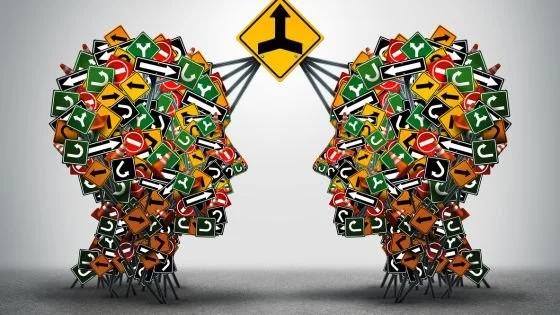Boundaries, Agreements, Ultimatums, and Rules... Oh, My!: Demystifying the Jargon
Have you heard the word "boundaries" and felt uncertain what that even means and how to practice them? When you hear the word "rule" is there retraction in your body? Stubbornness? Resigned? When you hear "ultimatum," are you reminded of a sense of pressure that felt icky? When you hear "agreement," do you feel skeptical, neutral, confident?
Before continuing to read this article, I invite you to think about or journal what comes up for you with each of these words. Concepts, images, emotions, physical sensations... Sit with each one to notice your implicit and explicit associations.
Have you done that...? Great! Now, we're going to use the topic of smoking cigarettes as an example to understand the distinctions in motivation, energy, tone, and application. Let’s dive in to clarify what many have a vague notion of and often mix-up.
What's a Rule?
A rule is a clear expectation of actions or behavior with a clear consequence if not adhered to.
A good faith rule has a value neutral or positive motivation of health, safety, and/or efficiency that serves the system.
Whether it's an institution like a school, factory, hospital, or a parent or boss... rules are created by a position of authority. There is little to no dialog with the people whom the rule affects and as a result sometimes very little enrollment in honoring them.
Rules might include:
a dress code
curfew
speed limits, etc.
With clear consequences:
getting sent to the principle's office
being grounded
getting a ticket
Rules can be very helpful to create clear guidelines and keep our environment and people safe. *While we talk a lot about Rules of Fair Fighting, when discussed and used mindfully, they are best practices that thrive when both people feel enrolled in them. If you don’t stick to them, the clear consequence is your fighting will remain stuck and dysfunctional.
Some people have no problem or are actually very excited to follow rules. Some people take them for granted. Some people bristle and rebel. Where rules get tricky and often fall apart and lead to a big mess is when they're applied between two or more adults in relationships.
Does a parent still tell you what to do now that you're grown? Has a friend, partner, or ex tried to tell you where/what you can eat, what to wear or who to engage with on social media, when you can see the kids, etc. and made no adjustments to their own actions?
Example of a rule statement:
“You have to stop smoking.”
What I often see and hear in my office is rules in an intimate relationship lead to lack of teamwork, lack of trust, and resentment. One person almost invariably feels controlled. Speaking of control, next we'll discuss Ultimatums.
What’s an Ultimatum?
An ultimatum is a rigid and final demand for another's behavioral change accompanied by a threat of retaliation or loss of connection. It is coercive cause and effect. If this, then that... It is offered in the guise of a choice yet pressures the outcome with negative reinforcement.
Look, I get it. There are valid reasons to be fed up with someone in your life. Maybe they struggle with addiction, lying, cheating, etc. Those things are super harmful to a relationship, so why not bring out the big guns? Sometimes, you need leverage to create lasting change. However, if this method is used, it will most likely create equal or deeper irreparable damage to the relationship. Because of our culture’s emphasis on internal motivation, it can also create a double-bind of questioning the motivations and trust in the person being asked to change. If they change because they fear being punished, can you trust the longevity of that change?
Example of a ultimatum statement:
“If you keep smoking, I’m going to cut off your credit card.”
When you’re tempted to give an ultimatum, scan how you’re feeling, your motivations, your rationale of ends justifying means, etc. If you need support in figuring out how to get the change you need without resorting to an ultimatum, seek couples therapy! A skilled therapist can help you find a more collaborative route.
What’s a Boundary?
A boundary clarifies what is and is not acceptable for us to give, receive, and have in our sphere. We can identify and express clear actions we’ll take to keep ourselves physically, emotionally, and mentally safe. It is a consistent consequence we’ll do based on an environment or another’s actions.
They are ideally negotiable, subject to change over time, and expressed in a calm state and from a place of personal power and sovereignty.
Everyone has a different reaction to this concept. One of hesitation, ambivalence, ideas about rigidity or selfishness. Some people visualize a boundary as a wall, fence, moat, etc. There are a lot of metaphors to explain why boundaries are not selfish. Pouring from an empty cup, putting your face mask on first…They are self-protective to maintain healthy energy for yourself and your ability to engage with others. Boundaries help us avoid burnout and model to those around us that we are willing to have conversations about how to respect their needs, too.
Example of a boundary statement:
“I will not be around cigarette smoke. If you smoke during our quality time, I will move to a different space. I likely won’t be intimate with you until you’ve showered and brushed your teeth.”
Boundaries do not need to be justified.
That being said, it’s often really helpful for people we’re close with to understand how what they’re doing is serving you or the relationship to feel more enrolled. If they learn that several people you loved died of lung cancer or that you have an allergy to nicotine, they’re more likely to understand the need to help protect your emotional or physical safety and be a teammate with you in that.
What’s an Agreement?
An agreement is a mutually chosen social contract that specifies trackable expectations of behaviors, time limits, and best practices. These can be on topics of home care, parenting, finances, communication preferences, conflict resolution time-outs, etc.
An agreement can be re-negotiated at any time when one or both of you find resistance, struggle, or fault with the current approach.
I recommend that people write down their agreements and discuss changes during set check-in times. The value of this is clarity, ability to track and remember for our neurodivergent folks, and to avoid suggesting changes from a place of trigger, but instead openness and curiosity.
Example of an agreement statement:
“We will look into methods to limit or discontinue smoking within the next six months and come up with a support plan.”
Power Dynamics
Yikes! If like me, you cringe at this image, you just got an intuitive and physiological hit of a power dynamic.
Rules and Ultimatums have an inherent "power over" dynamic. One person or institution has implicit or explicit authority and creates consequences with little to no collaboration with the people who are affected by them. These are often stated, written, or demanded.
Boundaries & Agreements have a "power with" dynamic. There is flexibility, teamwork, adaptability to context and serving to a mutually respectful connection. Power with dynamics involve requests and negotiation.
Next time you’re wondering if your partner is laying down a house rule, a boundary, or an ultimatum, pay attention to their tone, motivation, and what they, you, or the relationship will get out of their approach. Do you have power to provide input or perspective to negotiate? Keep in mind, these concepts can feel extra muddled if you’ve experienced a lot of trauma and toxicity in relationships. Now that you understand the difference between these concepts more clearly, you might want help discussing and applying them with your partner. We’re here to help!
My name is Sky Yeater and I am a Licensed Professional Counselor Associate at the Center for Couples Counseling. I am an LGBTQ+ person and professional passionate about helping couples and individuals find empowerment in their lives and relationships. If you’re looking to grow with new tools and humor, call (832) 827-3288 to set up your free phone consultation. Our Center serves couples and individuals in League City and Houston, Texas and all residents of Texas online!
Interested in Meeting a Couples Therapist in League City, TX?
If you want to improve your relationship and reconnect with your partner, take action now and start being more curious about your relationship. At Center For Couples Counseling, one of our skilled couples therapists can help you and your partner navigate your challenges and rediscover the curiosity and passion that brought you together in the first place. Don't wait any longer to invest in the health and happiness of your relationship. To meet with a couples therapist follow these three simple steps:
Contact us to schedule an appointment
Meet with one of our skilled couples therapists
Begin to find the curiosity in your relationship and reconnect with your partner!
Other Services Offered at Center for Couples Counseling
At Center For Couples Counseling, our team of skilled therapists understands that your relationship may be facing different challenges. In addition to couples therapy, our Texas practice offers individual therapy, infertility counseling, postpartum anxiety and depression counseling, therapy for self-care and burnout, and therapy for perfectionism. For more about us check out our FAQs and blog!







